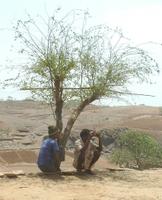
When the entire south India passed through a series of suicide incidents, I wondered how the farmers of Gujarat read it with a pinch of salt in their local newspapers. They had felt dejected on the reasons for the suicides. Many of these readers went through the same trauma but never thought of committing suicide. There is always a tomorrow is what they said when asked why they didn't take the ultimate step. The Gujarati resilience and the business culture helped them to survive. Not only survive but also progress.
As Andhra farmers face, these farmers also face sinking wells and rising debts. But why is that they don't take the steps their counterparts in south take. The reason is simple. Gujarati farmers make their life large while the farmers in Andhra cannot see beyond their one time debt and one time crop failures. Even when the state faced worst drought, there were hardly any suicides reported. This extent not only to farmers but also to all the Gujaratis whether they are big time traders and businessmen or to small time salt pan workers. They know how to overcome problems. They face the problem head-on and try to solve it. But this does not undermine the problems the farmers in south India faced. I asked a tribal farmer in north Gujarat's Sabarkantha district what is his opinion on not being able to get into the field for three consecutive years. Though his reply was simple, it created a dent in my thinking. This fifty plus farmer and his family have faced droughts, debts, crop failures throughout their life and the drought was nothing new for them. "It's part and parcel of life and life is too precious gift to give away so easily. We have learnt to safeguard it," he said in Gujarati with heavy tribal accent.
Later I realized that his family of five walked five kilometers one way to reach the site where the government organized drought relief work. All the five earned less than Rs 50 per day and walked back another five kilometers. Officially they should have got Rs 200. But the balance is pocketed by the middlemen. But they have no complaints. "If we resist, even this will vanish."
Life in Gujarat is practical experience. A Gujarati's schedule can never be bookmarked nor planned. Whether it is plague in Surat, cyclone in Kandla or earthquake in the entire state, Gujaratis have come out of all these disasters with flying
 colours. I have had the experience of approaching beauracracy in Kerala related to some household matters and each and every official that I approached pointed me towards the other. Everyone gave me advises on what I should do to get my work done. I got all the red tapes on paper from these guys. But none demanded money probably because it is not open. But I had a very easy going in Gujarat to transfer all these papers to Kerala. You go to one table and the guy will do the rest. You just have to sit and watch. He may be expecting some money but his expectation is not beyond Rs 50. Anyhow, I did not pay. But I am sure he may have made some cursory remarks but as soon as the next customer arrives, he forgets me. This is what the farmers also do. As soon as the rain arrives and their land gets fertile, they forget the past three years of drought. They look towards the next step. If the crop fails, then they look towards the next crop, next season, next rain and next harvest. There is always a 'next' attached. There is always a hope attached to this next. What these farmers say is that the farmers in south India do not believe in this 'next'.
colours. I have had the experience of approaching beauracracy in Kerala related to some household matters and each and every official that I approached pointed me towards the other. Everyone gave me advises on what I should do to get my work done. I got all the red tapes on paper from these guys. But none demanded money probably because it is not open. But I had a very easy going in Gujarat to transfer all these papers to Kerala. You go to one table and the guy will do the rest. You just have to sit and watch. He may be expecting some money but his expectation is not beyond Rs 50. Anyhow, I did not pay. But I am sure he may have made some cursory remarks but as soon as the next customer arrives, he forgets me. This is what the farmers also do. As soon as the rain arrives and their land gets fertile, they forget the past three years of drought. They look towards the next step. If the crop fails, then they look towards the next crop, next season, next rain and next harvest. There is always a 'next' attached. There is always a hope attached to this next. What these farmers say is that the farmers in south India do not believe in this 'next'.
No comments:
Post a Comment